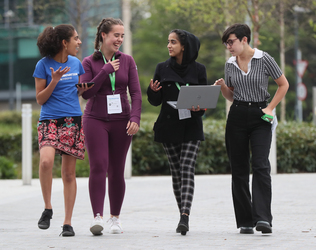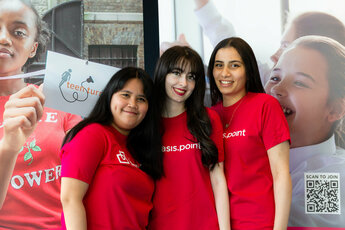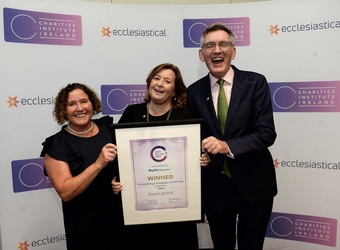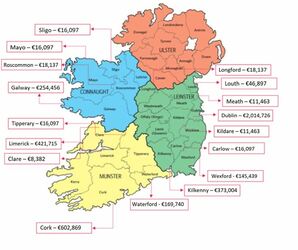![Some members of the basis.point Board of Directors at a think tank earlier in the year. [L-R] Pat Lardner (Irish Funds), Sonya Mooney (Northern Trust and basis.point company secretary), Fiona Mulcahy (independent director), Eimear Cowhey (independent director), Declan O'Sullivan (Dechert), Eve Finn (LGIM), Colm Clifford (independent director), Clive Bellows (Northern Trust) and Edel O'Malley (basis.point CEO)](https://www.fintel.org/images/ei_12362.jpg)
Some members of the basis.point Board of Directors at a think tank earlier in the year. [L-R] Pat Lardner (Irish Funds), Sonya Mooney (Northern Trust and basis.point company secretary), Fiona Mulcahy (independent director), Eimear Cowhey (independent director), Declan O'Sullivan (Dechert), Eve Finn (LGIM), Colm Clifford (independent director), Clive Bellows (Northern Trust) and Edel O'Malley (basis.point CEO) (click to enlarge)
According to the Department of Education, 92.3% of students completed their senior cycle in 2018/19 (DES, 2020). However, the picture changes when we look more closely at schools serving areas of acute economic disadvantage where school completion rates are statistically and significantly lower than in schools serving more affluent populations (House of the Oireachtas, 2019).
Each year 12,400 children are born into poverty in Ireland (CSO 2019). The far-reaching benefits of education in tackling the cycle of intergenerational poverty are well documented and yet Ireland has one of the lowest levels of investment in education among OECD countries.
Against an OECD average of 5% of GDP, Ireland invested 3.5% in primary, secondary and third level education in 2016 (OECD, 2020).
Investing in a happier healthier society
basis.point was established in 2014 in response to this inequality of opportunity and began funding educational programmes in 2016. The idea behind the charity was that by pooling resources and investing strategically in proven educational programmes consistently over time, the impact of collective giving would be greater than the sum of the individual parts.
A small number of corporations such as Northern Trust, Lord Abbett and Brown Brothers Harriman became early adopters of the concept of joined-up-giving, pledging significant muti year donations and lending credibility. The concept soon grew legs and today basis.point are proud to have over 100 corporate patrons from the Irish fund industry and its wider ecosystem, and more than 350 individual patrons and supporters.
The charity plays a role in alleviating the challenge of finding community-based programmes that make a proven sustainable difference to society and caters to the needs of both large multinational organisations such as new patrons Amundi and IPUT and smaller more niche home-grown offerings such as Atlantic Star Consulting.

L-R: Sanvi Kaushik, Amy Carruth, Maha Shahzadi and Aoife McNelis pictured at the Irish Finals of Techovation (click to enlarge)
basis.point recently expanded their Board of Directors and with the addition of Frank Gannon, KPMG and Eve Finn, LGIM, the board has a balance of expertise drawn from patron organisations and independent directors.
Thanks to this collective effort, basis.point has now raised over €4.1 million and has helped upwards of 40,000 young people to achieve their life potential, living happier, healthier, and more fulfilling lives.
Inspiring the next generation
Examples of how basis.point are doing this abound. Take their work with charity partner Teen Turn. Teen-Turn is a charity established by American born Joanne Dolan to encourage girls to pursue careers in STEM related areas. Joanne is passionate about levelling the playing field, combatting stereotypes, and inspiring the next generation of girls to develop skillsets necessary to embrace the 21st century workplace.
Funding from basis.point has enabled Teen-Turn to scale at pace and modify their programme to include girls from marginalised communities many of whom may be resident
in direct provision centres. And it is not lack of desire or ambition that holds these girls back. Girls living in direct provision centres face additional hurdles at every corner. Participating in grind schools or after school activities may mean missing the only bus to return to their accommodation, it may mean missing their evening meal which is served at a fixed time each evening. Funding has allowed Teen-Turn to go that extra mile, to pay for the taxi home, the hot meal that would otherwise be missed.

Teen-Turn Alumni and Lead Mentors, Dahab Sharaby, Sarah Stefan and Kaye Marie Rabadon
In partnership with Prestige Patron BNY Mellon, basis.point have also been able to unlock additional funding for a new three-year Digital Citizenship programme to build digital equity for teen girls, particularly in the North-East Inner City, Dublin.
Championing the programme within BNY Mellon, Paul Kilcullen, CEO of BNY Mellon Fund Services and Ireland Country Head, commented
“Being prepared for the digital world involves learning how to engage positively, critically and competently in the digital environment. We are delighted to work with Teen-Turn and basis.point to enable and empower girls in this digital world”
Ultimately it is about inspiring girls to follow careers in the STEM subjects. As a result of basis.point funding, the industry has helped establish an army of volunteer mentors, including alumni from universities who were part of the initial Teen-Turn intake, who work one-on-one with girls. They really are an army on the march!
Developing numeracy and literacy
Another example of how joined-up-giving is having a positive impact on broader society is through their work with the Early Learning Initiative (ELI). An important area of focus has always been early intervention. Often what happens before entering formal education is key to how a child will engage with the school system.
Research shows that children from disadvantaged communities if left without any additional support, start school with a baseline vocabulary of approximately 4/500 words. This contrasts sharply with children from middle socio-economic populations, who have on average 1,200 words starting school (Hart and Risley, 1995). It is virtually impossible to bridge this gap once established and most of these children never catch up.
![Launching their new partner programme, basis.point, HSBC and Foróige celebrate joined-up-giving [L-R] Edel O'Malley (basis.point), Eimear Cowhey (independent director), Ronnie Griffin (HSBC), Sean Campbell (Foróige), John Weedle (HSBC), Karen Hannify (Foróige), Helen Godsil (HSBC) and Paul Heffernan (HSBC).](https://www.fintel.org/images/ei_12365.jpg)
Launching their new partner programme, basis.point, HSBC and Foróige celebrate joined-up-giving [L-R] Edel O'Malley (basis.point), Eimear Cowhey (independent director), Ronnie Griffin (HSBC), Sean Campbell (Foróige), John Weedle (HSBC), Karen Hannify (Foróige), Helen Godsil (HSBC) and Paul Heffernan (HSBC).
Home Visitors are frequently recruited from the families who have participated in the programme. Having seen their toddlers off to school, many of the mums and dads are ready for some part time employment. They have learnt effective parenting skills, grown in confidence, witnessed first-hand the effectiveness of their new skills, and are best equipped to share their newfound parenting skills with others from the local community.
basis.point was quick to financially support this programme and over the past few years, over 240 families have benefitted from their support, which is now being rolled out to Connacht and Munster. Additional funding from Morgan Stanley has increased the number of participating families and along with BNP Paribas and Kennedy Wilson have facilitated modification of the programme to meet additional needs of families who are affected by homelessness.
The communities they are working with in Dublin, Galway, Limerick and Louth are really embracing the programme. Ireland is becoming a much more multicultural society and this project is crucial for many families to integrate and engage with the education system.
The aim is that by intervening early, children and their parents are offered the best start in life, so that they can fully engage at school. The impact of such early intervention is only now starting to show dividends as the children that we have supported are entering secondary school.
Helping those who fall through the gaps
Another programme to help kids who struggle with formal education has recently been launched in partnership with basis.point Foroige and HSBC. An innovative 21st century employability initiative, this programme brings together three powerful strands of non-formal education.
And whilst this tiered approach is new, there are some examples of young people who have initiated this layered approach with Foroige from an early age and carved their own way.

basis.point receiving recognition from the Charities Institute Ireland L-R Joanne Shaw, basis.point Head of Marketing, Edel O'Malley basis.point CEO and Declan O'Sullivan, basis.point Board Director. (click to enlarge)
Farouq Raheem is one such person and in addition to participating in the Network for Teaching Entrepreneurship and the Digital Hub, considers his participation in the Leadership for Life programme as the highlight.
“This programme truly made me the person I am today, and it really has opened up a new world of opportunities for me. I’ve heard lots of people talk about whether leadership skills are nature or nuture – well I want to tell you that they can be nurtured. We can all be leaders in our own life and in our own way, if we know how”
Farouq went on to study sports and leisure management at TUDublin. He attributes his resilience and acquired leadership skills to surviving a period of homelessness, and has one more year to complete before graduation.
Fulfilling the social element of ESG commitments
The range of programmes supported by basis.point is extensive and focuses not simply on the nuts and bolts of literacy and numeracy, but also on peripheral soft skills such as self-esteem, confidence, willingness to engage with authority and resilience. All of which are essential in equipping young people with the skills to financially support themselves through employment.
Conscious of the ever-greater need for support throughout the country, during 2021 basis.point restructured its corporate regular giving platform. The overwhelmingly positive industry response, coupled with fundraising initiatives like the RBC Race for the Kids, Adminovate Not for Profit Conference, and the Boston Marathon, ran by Killian Lonergan, generated €700,000 in 2021 alone. This has allowed basis.point to expand programme coverage across Ireland. In addition to the charity partners previously mentioned, basis.point also work with Archways, Barnardos, TU Dublin, Limerick Youth Services, and Business in the Community to enhance the educational opportunities for children throughout Ireland.
Alleviating the educational divide is a constant challenge. basis.point were recently recognised by the Charities Institute of Ireland for Best Fundraising Campaign below €1million. Next year they hope to be up there with the big boys. If you would like to learn more, visit their comprehensive website for a full listing of Patrons and Supporters and details on how you can help. Recurring annual contributions for corporates range from €3000 to €10,000+ and from €250 to €1000+ for individuals.
As the discussion and metrics around ESG gains momentum, corporates, and individuals alike, grapple to come to terms with their social impact. basis.point fills a void and simplifies this task. What they offer is a unique conduit for an industry to come together, to pool resources to make a genuine difference to the lives of those living with disadvantage. In doing so, collectively as an industry they are doing what is ethically right whilst at the same time securing a long-term sustainable talent pool of diverse, educated, and inclusive young people.
References
Cahill, K. (2020) School Markets and Educational Inequality in the Republic of Ireland. The Oxford Research Encyclopedia, Education. DOI: 10.1093/acrefore/9780190264093.013.847
Department of Education and Skills (2020) Retention Rates of Pupils in Second-Level Schools. Entry Cohort 2013. Dublin: DES
Houses of the Oireachtas (2019) Joint Committee on Education and Skills Report on Education inequality and disadvantage and barriers to education. Dublin: Houses of the Oireachtas. Available at: https:// data.oireachtas.ie/ie/oireachtas/committee/dail/32/joint_committee_on_education_and_skills/ reports/2019/2019-06-05_report-on-education-inequality-disadvantage-and-barriers-to-education_ en.pdf (Accessed: December 15, 2020).
OECD (2020) Education Policy Outlook: Ireland. Paris: OECD Publishing. Available at: https://www.oecd. org/education/policy-outlook/country-profile-Ireland-2020.pdf (Accessed: December 10, 2020).
Hart, B., & Risley, T. R. (1995). Meaningful differences in the everyday experience of young American children. Paul H Brookes Publishing.

